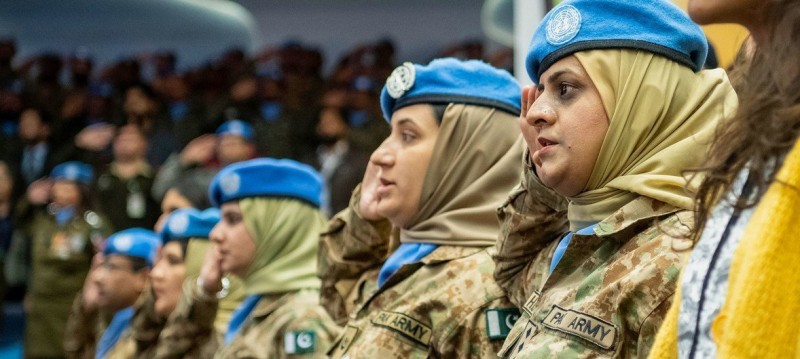
UN Photo/Mark Garten Pakistani women peacekeepers in the audience at the National University of Science and Technology in Islamabad, where Secretary-General António Guterres delivered an address on the topic of peacekeeping.
UNESCO Director-General Audrey Azoulay made the appeal in her message to mark the International Day of Women in Multilateralism, which highlights their role in building peace and ensuring sustainable development.
It also provides an opportunity to advocate for increased representation of women in key decision-making positions in global collaboration.
‘Incomprehensible inequality gap’
“Celebrating their achievements, their views and their devotion also means drawing attention to the incomprehensible inequality gap which in too many contexts continues to exist between women and men,” said Ms. Azoulay.
She warned that at the current rate, it would take more than 130 years to reach gender parity, citing information from the World Economic Forum.
“Equal rights cannot wait,” said Ms. Azoulay. For this reason, UNESCO has made fighting gender inequalities a global priority, together with breaking down deeply ingrained stereotypes, she added.
Fighting harassment online
Building equality through multilateralism implies acknowledging the role women have in the process, and ensuring that all who want to work for change draw inspiration from them, the UNESCO chief said.
It also implies making strong commitments, and implementing them, especially in multilateral forums.
“This is why on International Day of Women in Multilateralism 2023, we are focusing on a commitment at the heart of UNESCO’s raison d’être: the fight against hate speech, with a particular emphasis on the issue of harassment of and violence against women in the digital environment,” she said.
Undermining democracy
The matter is urgent, as evidenced by a recent UNESCO survey of women journalists, one of the professional groups that is most affected.
The survey revealed that 73 per cent reported having been subjected to online violence in the course of their work.
“When women are targeted because they are women, a certain view of public debate and a fundamental requirement for democracy are also undermined,” said Ms. Azoulay.
Gendered disinformation
UNESCO is holding a global dialogue at its Paris headquarters on the International Day, to advance effective responses to online gendered disinformation.
Recommendations will inform the agency’s ongoing work to establish principles for the regulation of digital platforms, so that information is a “public good” while preserving freedom of expression.
They will also contribute to a UNESCO Conference on shaping digital platform regulation that will be held in February, bringing together representatives from governments, civil society, the private sector, academia, the tech community and other stakeholders.
“This is precisely the point of this International Day: mobilizing the international community to support equal rights and dignity for all – particularly women and girls,” said Ms. Azoulay.

